An uncomfortable truth: the internet access of many Amazon dwellers depends on Elon Musk, a multibillionaire who has expressed sympathy for the global far right.
According to a survey carried out by SUMAÚMA using data from Brazil’s National Telecommunications Agency (Anatel), Starlink antennas are present in more than 96% of municipalities in the vast region of northern Brazil known as the Legal Amazon. As of July 2024, 742 of the 772 municipalities in the region had at least one satellite internet antenna made by the subsidiary of SpaceX. Today, the number could be even higher.
A constellation of low-orbit satellites– a technology no one else in the market currently has – provides fast, easy-to-use internet to areas where there used to be little or no connectivity. Starlink is spreading among people and communities who previously used expensive, unstable services, those who have never had connectivity, and Brazil’s public entities such as the Army, Petrobras, and the National Foundation of Indigenous Peoples (Funai).
On the one hand, increased internet access allows for telemedicine, online education, security measures, and entrepreneurship, as well as vital, basic, day-to-day communication. On the other hand, the current monopoly raises concerns about the concentration of essential infrastructure in the hands of a highly controversial individual. There is the possibility of service interruption and data protection and management issues, to say nothing of other problems, like the lack of media literacy education and the use of technology by criminals such as gold miners and drug traffickers in remote parts of the Amazon forest.
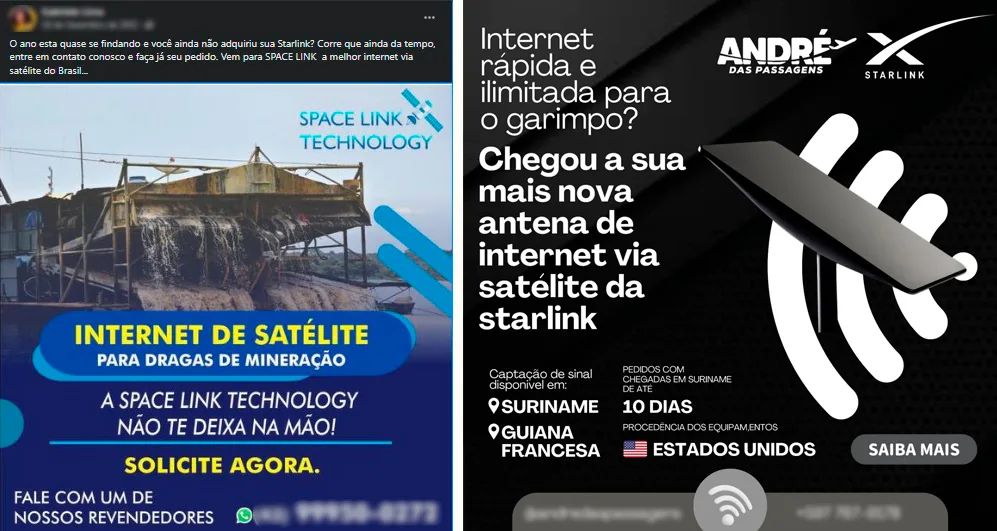
Along with benefits for communities like telemedicine and education, internet connections are also useful to illegal miners, as these ads by resellers openly advertise
Worries about Starlink have increased after X (formerly Twitter) failed to comply with Brazilian law leading to Supreme Court Justice Alexandre de Moraes blocking the social media site in Brazil. On September 13, de Moraes ordered BRL 11 million reais (approximately USD 3.3 million) to be transferred from Starlink’s accounts to the Brazilian federal government to guarantee the payment of fines imposed on X for failure to suspend the accounts of people under investigation for the attempted coup on January 8, 2023. Both companies are controlled by Elon Musk.
In order to understand the risks resulting from Starlink’s dominance in the Amazon, SUMAÚMA spoke to scholars, activists who work on internet-related issues, and people who use the service. These respondents pointed out problems and suggested ways to mitigate the risks. Meanwhile, the federal government says it is working to correct its historical failing by connecting the region.
From disconnected to dependent
The only reason Starlink was able to expand at such a fast rate in the Amazon is that the Brazilian government failed to connect the region for decades. According to Meaningful Connectivity, a report published in April 2024 by the Brazilian Network Information Center (NIC.br), the North is one of the least connected areas of the country. Only 11% of the population in the Northern Region has access to the highest level of meaningful connectivity, that is, full capacity to exercise citizenship in the digital environment, which includes adequate connection speed and internet navigation skills.
Infrastructure challenges are part of the problem. Laying fiber optic cables in areas of dense forest and enormous rivers —a task public authorities have historically failed to do— requires a considerable investment and is an unattractive project for the private sector.
A major problem is the so-called last mile. Often, when an internet connection reaches a major city, it doesn’t extend to nearby rural locations. “Companies have no interest in investing in infrastructure to serve these territories, which they consider unprofitable. We’ve lived through a series of governments that were unable to get companies to make these investments,” said Hemanuel Veras, a doctoral candidate researching connectivity at the Federal University of Rio de Janeiro and member of the Public Center for Communication in Manaus.
Starlink flourished in this environment. After an approval process accelerated by the Bolsonaro government in January 2022, the company began commercial sales in the Northern Region in November of the same year, leading to its current widespread distribution.
The lack of competition puts continuity of service at risk. On August 29, to punish X, de Moraes ordered Starlink’s bank accounts in Brazil to be frozen. Blocked accounts, which have already been unfrozen, did not mean Starlink could legally cease its service. According to digital rights experts, a suspension would be a violation of the terms of service with consumers and could lead to sanctions by Brazil’s National Telecommunications Agency (Anatel), as well as lawsuits.
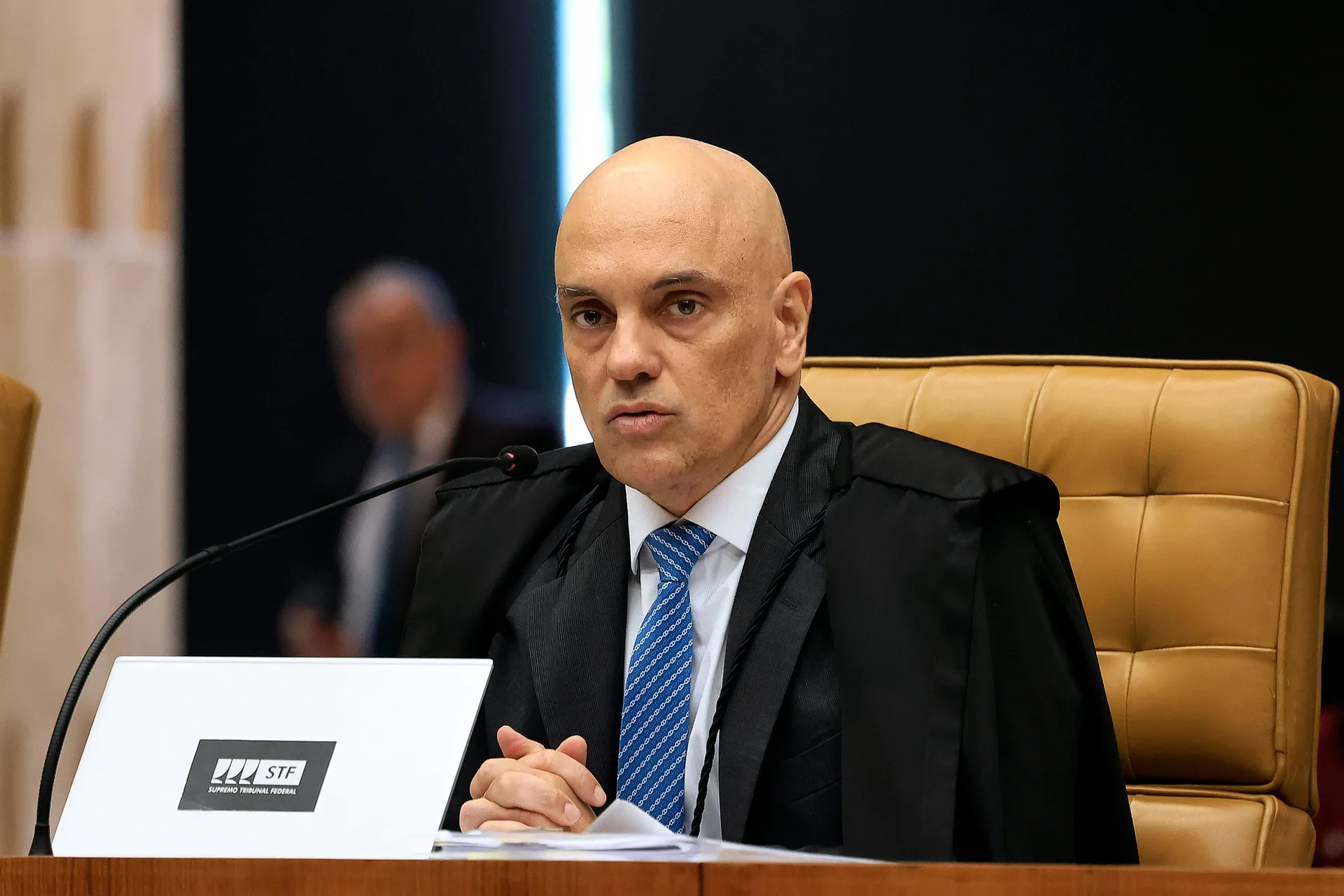
Supreme Court Justice Alexandre de Moraes punished Starlink as a way to pressure Elon Musk over the court case involving X. Photo: Rosinei Coutinho/SCO/STF
“Even without the ability to be paid, consumer rights require the company to maintain the continuity of the contracted service. Otherwise, customers could challenge its decision in the courts,” said Luã Cruz, co-coordinator for Telecom and Digital Rights at the Consumer Defense Institute. But when it comes to the controversial Elon Musk, who seems to believe he is above the law, anything is possible.
De Moraes appears determined to double down on his strategy of punishing Starlink to pressure Musk: on September 19, he issued a new fine of BRL 5 million reais per day (approximately USD 900,000) after X circumvented its ban in Brazil. With Musk’s unpredictable personality under such pressure, concerns are increasing about the future of connectivity in the Amazon region. “It’s not so simple for him to stop offering the connection, but it’s good to remember that we’re not talking about a very consistent person. It wouldn’t be surprising if he decided to do something like suspension, even though it would mean losing capital and dealing with sanctions from Anatel,” said Fernanda Kalianny Martins, director of InternetLab.
Another uncertainty regarding continuity of service surfaced on September 24. The Minister of Communications, Juscelino Filho, said that if Starlink had intentionally failed to comply with the court decision in order to keep X accessible, the ministry could suspend Starlink’s permission to operate in Brazil. “Depending on the findings, if there is any sign of non-compliance with a court decision, the necessary measures will be taken. One of them, as I said, is the opening of proceedings to revoke permissions,” he said.
Internet scholars consider it unlikely that the minister will go ahead with his threat. Apart from the bureaucratic and legal hurdles, interrupting the service would have extremely high political costs, as it would leave hundreds of thousands of users without connectivity.
“I don’t think it’s feasible in the short term. It would have a political impact on the government and a material impact on the lives of entire communities. It’s a movement in the political sense,” said Paulo José Lara, co-executive director of Article 19 Brazil, a non-governmental human rights organization that defends freedom of expression and access to information. “The effects would be terrible, especially in remote areas Starlink was able to reach where no other means of connectivity existed.”
But even if service is maintained for the moment, there is no guarantee of continuity in the medium and long term. Starlink’s license to operate runs until March 2027, and the lifespan of one of its satellites is approximately five years. If the company one day decides that Brazil, where it has more than two hundred thousand users, is no longer a market of interest, the current situation would leave vulnerable populations without an internet connection once again.
“I don’t believe the current turmoil will lead Starlink to suspend activities, but it could have repercussions in the medium term. It’s unclear how the legal proceedings will impact services in the future,” Lara said.
Having a single provider also entails other risks, noted Veras. “People are in danger of being unable to communicate if, for example, the service fails due to operational issues, or they can end up paying exorbitant prices since there are no competing companies,” he said.
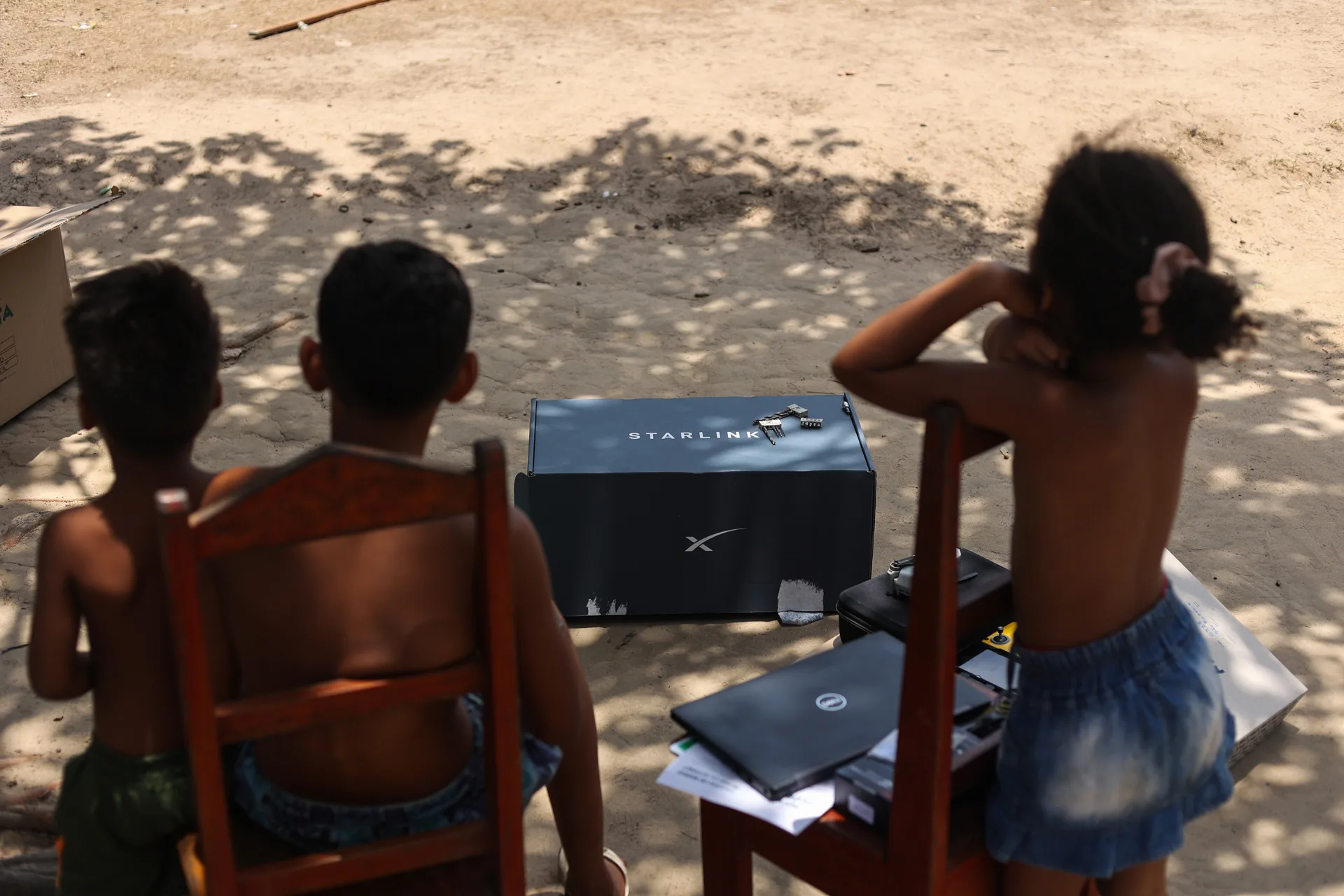
If Starlink were to cease operating in Brazil, thousands of communities would be left unable to communicate since there are still no real alternatives. Photo: Filipe Bispo/SUMAÚMA
Who controls the data?
Many of the questions related to Starlink are about the company’s data policy. These concerns are heightened in the Amazon due to the unique, strategic nature of the region. Two terms of contract, one international and one specific to Brazil, drive Starlink’s data privacy policy. Brazil is subject to the General Data Protection Act (LGPD), a 2018 law generally considered to mandate very strict protections for user information.
But at least one sentence in the service agreement leaves room for Starlink to use the data in other ways: “Because we are a global company, be aware that your personal data may be transferred, stored, and used abroad, primarily in the United States and the United Kingdom,” the document says.
According to the company itself, the data collected includes approximate geographical locations, email addresses, financial data, and personal information. Once out of the country, this data is no longer subject to Brazilian protections, said Rafael Zanatta, director of Data Privacy Brazil, an association that works for data protection and digital rights.
He notes that the choice of countries to receive the data is no accident: “The United States and the United Kingdom offer lower levels of data protection. If it were transferred to a European country, we would be safer, because the GDPR [European data privacy law] is equivalent to the LGPD [Brazilian data privacy law],” Zanatta said. “This is a choice for more permissive jurisdictions.”
In its global policy, Starlink claims it does not “knowingly sell your personal information.” This does not prevent it, however, from using the data internally. Zanatta points out users “risk their geolocations being inferred and territories mapped.”
Gabrielle Bezerra Salles, digital rights expert and professor at Pontifical Catholic University of Rio Grande do Sul, warns that Musk could also use the data in his other tech companies, such as Colossus, a recent artificial intelligence initiative. “They have no interest in selling, [since] the bigger their own databases are, the better it is for them. Musk is launching an artificial intelligence superpower; he has an incentive to hoard the data and be able to process it at will.”
Once outside Brazil, data is also subject to secret requests and use by military and intelligence agencies, Zanatta warns. “The United States has a very large apparatus for forcibly obtaining information. They have mechanisms when there is a strategic interest, or military interest, for authorizing mandatory access to certain information via special courts.”
More cables and more competition
The main alternative to the Starlink monopoly is the expansion of the region’s fiber optic network. Initiated by the Bolsonaro government and continued by the current administration, the Connected North Program plans to invest BRL 1.3 billion (approximately USD 240 million) to build eight
Optical Transport Networks (OTNs), stretching more than 7,000 miles (12,000 km), capable of bringing broadband internet to disconnected areas of the Northern Region.
Three OTNs have already been laid: the 00, from Santarém, in Pará state, to Macapá, in Amapá state; the 01, from Santarém to Manaus, in Amazonas state; and the 03, which links Macapá and Belém, in Pará state. Installation of the 04 is currently underway, which will connect Boa Vista, in Roraima state, to Vila de Moura, a district of Barcelos, in Amazonas state. According to the federal government, all eight OTNs will be installed by 2026.
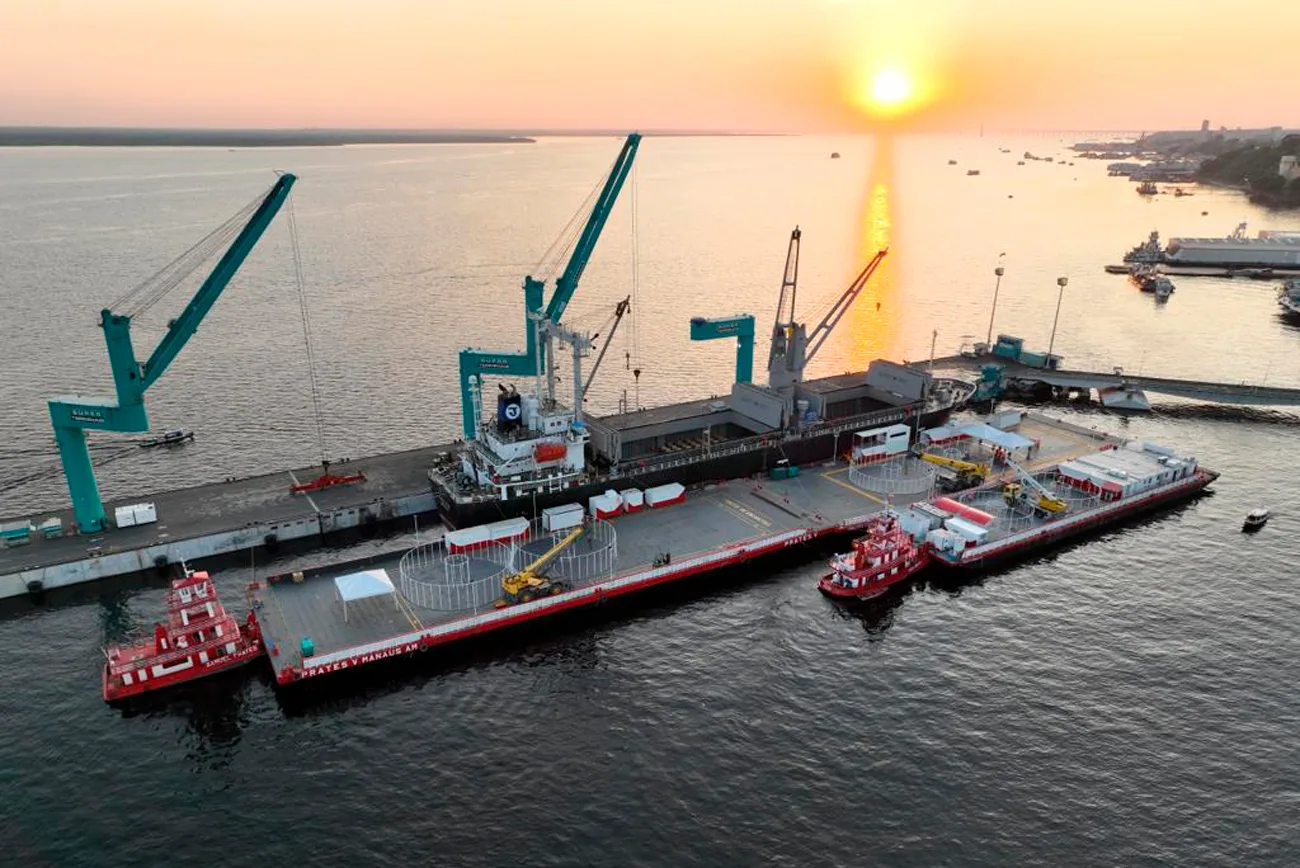
The Connected North Program foresees construction of eight fiber optic networks to run along rivers in the North for a total of 12,000 km. Photo: EAF
Brazil’s communications ministry said in an email that “the project seeks to connect the main cities within the Amazon region and small communities between them […] Which is the case, for example with OTN 03, which brings internet to cities on Marajó Island, such as Curralinho and Breves, which are among the lowest in the country on the Human Development Index.”
The agency added that “Indigenous communities will also be served by the OTNs, such as Belém dos Solimões, which will be connected to the 02, work on which should begin by the end of this year.”
Once installed, the infrastructure can be accessed by small and medium-sized providers, who will be able to carry out extensions and connect nearby locations. The communications ministry stated that “it is supporting the growth of these providers through resources from the Telecommunications Services Universalization Fund, which will have BRL 5 billion reais (approximately USD 900 million) available for loans by 2026.” On September 24, the government launched the Telecom Credit Access Program that offers credits to help small and medium-sized providers bring broadband internet to cities with less than thirty thousand inhabitants, with priority given to Quilombola, traditional, and Indigenous communities.
Another possibility to be investigated by public authorities is to demand an increase in compensation from Starlink. According to information from Agência Pública, the company paid BRL 102,000 reais (approximately USD 19,000) to operate in Brazil. The company is currently asking for permission to operate another 7,500 satellites in Brazil, up from the current 4,408. “Fiber optic operators obey more rules than satellite operators. Starlink’s operation was authorized without obeying any rules and with virtually no quid pro quo. We need to demand more in order to authorize the operation of new satellites,” said Oona Castro, Institutional Director of the Center for Research, Studies, and Training (Nupef), an organization that works to promote the safe use of information and communication technologies.
The researchers interviewed by SUMAÚMA stressed the need for greater investment in science and technology so Brazil can eventually develop its own low-orbit satellite system.
In the meantime, there is one more alternative: the arrival of competitors in the satellite internet market. On September 11, the French company E-Space, which also uses low-orbit satellites, was authorized by Anatel to provide internet in the country. It is not yet known when the service will be offered. Project Kuiper, a competing service from the company Amazon, is expected to come online next year.
“Competition tends to reduce the problem and improve the services provided. Although Amazon also has an eccentric billionaire, [Jeff Bezos], he is not as erratic as Musk,” said Cruz.
Starlink did not respond to questions.
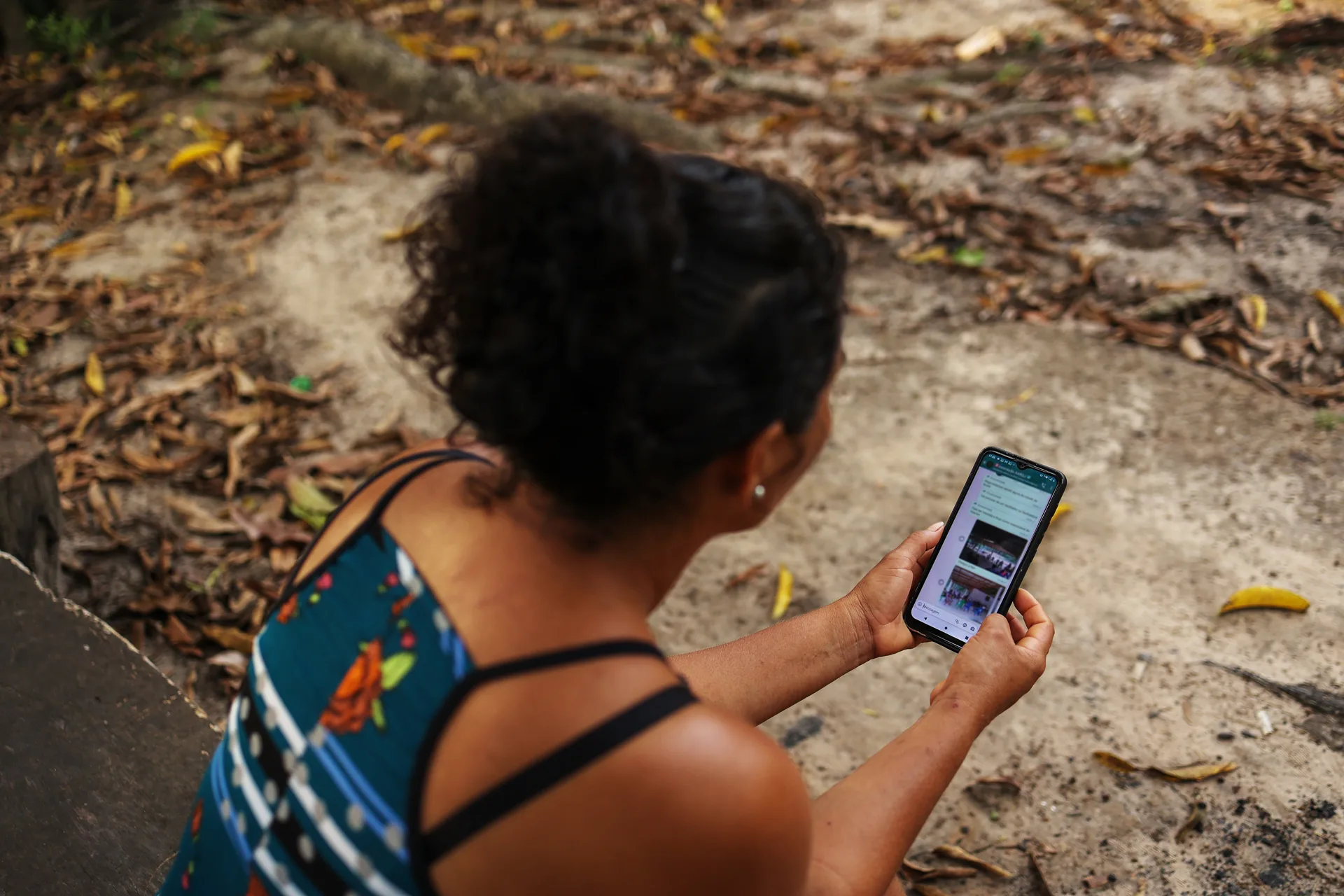
Starlink stores data in the United States and United Kingdom where it is no longer protected by Brazilian law. Photo: Filipe Bispo/SUMAÚMA
Report and text: André Duchiade
Editing: Eliane Brum
Photo Editor: Lela Beltrão
Fact-checker: Plínio Lopes
Proofreader (Portuguese): Valquíria Della Pozza
English translation: Maria Jacqueline Evans
Spanish translation: Julieta Sueldo Boedo
Copyediting and finishing: Natália Chagas
Editorial workflow coordination: Viviane Zandonadi
Editor-in-chief: Talita Bedinelli
Editorial director: Eliane Brum


